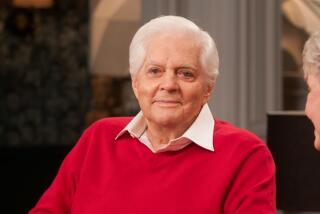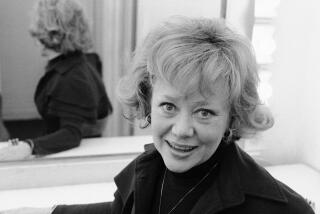TV REVIEW : ‘American Masters’ Toasts Hayes
- Share via
You know those signs demonstrators hold up: “Honk if you love. . . .” As much could be said for “American Masters’ ” first show of the season, an adulatory love fest called “Helen Hayes: First Lady of the American Theatre” (tonight at 10 on Channel 28; 9 p.m. on Channel 15 and Tuesday at 9 p.m. on Channel 50).
It’s not that Hayes hasn’t lived up to the advertising, but that the show is so undeviatingly formulaic. We get the usual mix of biography and rarely seen stills from the deep past, along with fascinating clips of more recent performances--including a few from the 1955 ANTA “Skin of Our Teeth” that featured George Abbott as Mr. Antrobus (seen on camera) and Mary Martin as Sabina (not seen). But we also get the de rigueur lavish praise from such eminent colleagues as Pat Carroll, Colleen Dewhurst, Jose Ferrer, Eli Wallach, Anne Jackson, Robert Whitehead, writer Sam Marx and caricaturist Al Hirschfeld.
Hayes herself is seen in snippets giving readings from past performances as part of a speaking tour. Lauded for her lack of pretense, she demonstrates it here with a cheerfully unassuming persona that may well have made her the friendliest, if not necessarily the brightest, star in a 20th Century theatrical firmament that she shared with Eva LeGallienne, the Lunts and Katherine Cornell.
A quick history is packed with photographs of a fresh young Hayes and her stage mother; Hayes with her husband, writer Charles MacArthur, and Hayes’ daughter, Mary, who died of polio in 1949, just shy of turning 20.
There are stills from “Bab” (1920) and “Victoria Regina” (1935) and her tentative (though well-awarded) career in films. Mention is made of the renaming of the old Fulton Theatre for her, but not of her silence in the face of its destruction in 1982 to make way for the Marriott Marquis Hotel--despite protests from other actors and stormy sit-ins. Her chance to take a stand when she was a lunch guest at the White House that same week came and went, unused.
Hayes was not a political animal. She emerges as sheltered, plucky, good-humored and uncomplicated. To quote Dewhurst: “What her audiences reacted to was her Americanness .”
To quote Hayes: “My chief talent was to try to do what I did very well.” That, ultimately, is the best assessment of this enduring life in the theater.
More to Read
The complete guide to home viewing
Get Screen Gab for everything about the TV shows and streaming movies everyone’s talking about.
You may occasionally receive promotional content from the Los Angeles Times.






